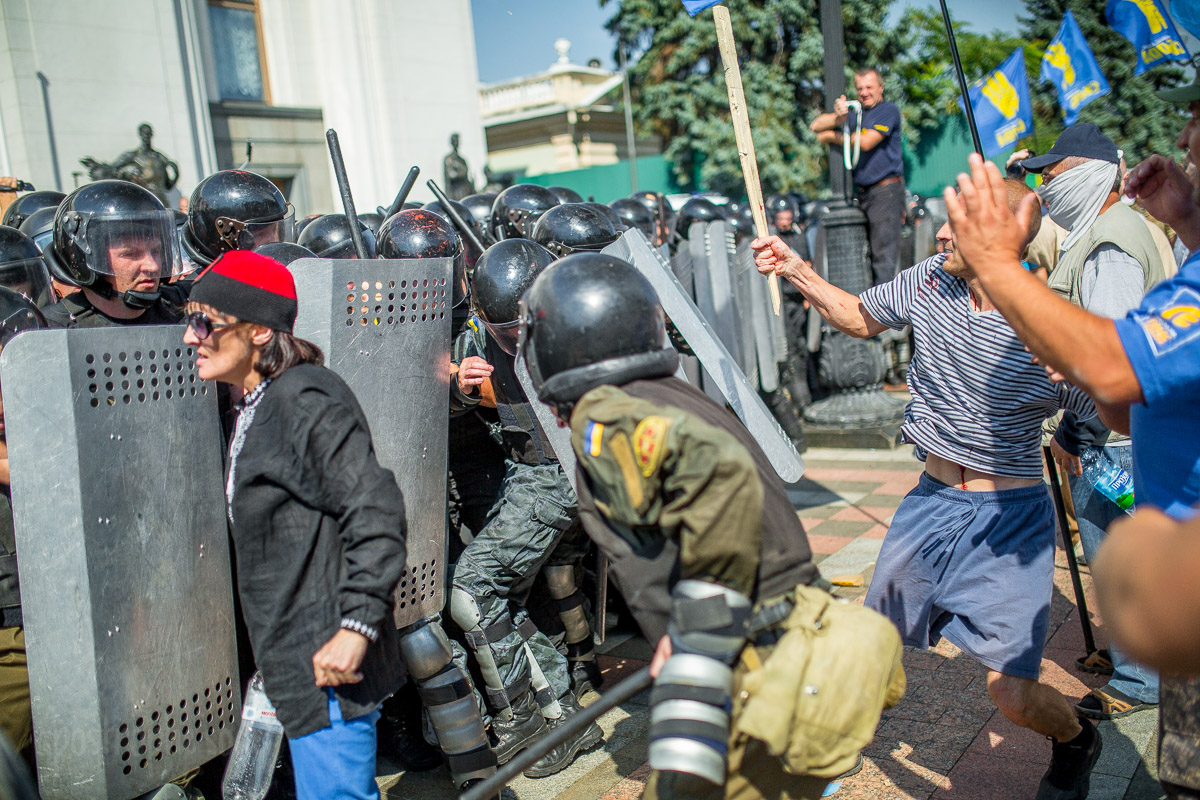On Monday, August 31, clashes erupted at a protest against decentralization law outside Ukraine’s parliament. Key opposition figures and parliamentary coalition parties protested the reform, claiming it would legalize Kremlin’s proxies in Ukraine. Experts admit Poroshenko’s administration failed to convey the true meaning of this reform to the public. This, in turn, lead to politicians capitalizing on the ensuing uncertainty, which culminated with 1 dead and over 100 wounded (mostly policemen due to a grenade attack at the Rada).
We looked through the decentralization laws to find out what they really mean.
Origins
Since independence Ukraine has suffered from the Soviet legacy of an extremely centralized system. The concentration of power and finances in the capital allowed for institutionalized corruption, perhaps best symbolized by Yanukovych’s Mezhihirya residence. Decentralization has been among the demands of Maidan protestors who ultimately toppled Yanukovych’s regime. You can read on the origins of decentralization in more detail here.
Decentralization is included as a requirement from Ukraine set in the Minsk agreement signed by Ukraine, Russia and its proxies in February this year. Under its provisions, Ukraine must adopt constitutional reform taking into account the specifics of Donbas regions.
The reform
On July 16, Ukraine’s parliament put the presidential administration’s decentralization bill on the agenda and sent it to the Constitutional court for approval. On July 31 it was OK’ed by the CC. A month later, it passed the 1st
hearing with a majority of 265 (with 300 needed for the bill to pass second hearing).
The reform’s proponents point out it is shifting more power from Kyiv to the local communities. The draft law organizes local governments into three tiers: from the community (“hromada”) to county (“raion”) to region. In lieu of powerful presidential-appointed regional governors, it introduces prefects for regions and counties which are tasked with coordinating local and state authorities and controlling the legality of county and regional councils’ decrees.
The constitutional amendments define local council powers in pretty broad strokes, most prominent being levying local taxes and defining economic and social policies of their constituents. Other important things include local referendums on key issues of the community and a guarantee that any increase in local powers would be followed with an increase of local budget.
Experts believe the law in its current form leaves loopholes for abusing of power by the President and presidential-appointed prefects (such as annulling decrees by local councils or dissolving them altogether upon a court decision). However, the reform’s proponents (including Poroshenko himself) praise the reform as a shift of power to local communities.
The point of contention
According to the draft, the new constitution would explicitly provide for special status of only its capital, Kyiv. However, the most controversial line of the constitutional amendment is article 18 of the “Transitional Provisions”, which says the following:
“The specifics of executing local governance in certain counties of the Donetsk and Luhansk regions are defined by a separate law”
Poroshenko insists this is in no way a “special status” provision and part of Ukraine’ obligations under Minsk agreements (which, according to the administration, Ukraine adheres to while Russia and its proxies do not). Critics of the Minsk agreements say that this provision was imposed on Ukraine by outside forces and constitutes capitulation before Russia’s invasion and legitimizing the Donbas “republics.” An appeal by Ukrainian intellectuals to the President stresses that the reform constitures "geopolitical subordination to the dictates of Russia." Ian Bond, the director of foreign policy at the Center for European Reform, claims that Russia's participation in the negotiation process invalidates the outcome, and that instead of pressuring Ukraine, the West should be helping Ukraine defend itself.
Some ground for those claims may be seen in the “separate law.”
The “Special status law”
The bill “On the special order of local governance in certain counties of Donetsk and Luhansk regions” was passed by the Ukrainian (Yanukovych-era) parliament on September 16, hot on the heels of the first Minsk agreement. It covers the territories currently occupied by Russian hybrid troops.
The law understandably caused trouble with Ukrainian patriotic opposition due to such provisions as a broad amnesty to “participants of the events in Donetsk and Luhansk regions.” It is unclear how far this amnesty would stretch and if “events” include murder and acts of terror committed by the militants.
Other controversial provisions are the extended status of Russian language as well as cross-border cooperation with local authorities of Russian border communities. Another point of content is the provision for “local militia units” created by local councils. On one hand, this sure looks like legitimizing DNR and LNR terrorists. On the other hand, a “militia” member should be a citizen of Ukraine and a resident of the community in question, meaning mercenaries from Russia wouldn’t be able to stay.
In March 2015, after the so-called “Minsk II” which defined a road map towards peace in Ukraine, the “special governance” law was amended to the effect that most of its provisions would come into force only after local elections under Ukrainian law and monitored by international observers would take place. This angered the “rebels” and the Kremlin, ostensibly because it allowed for little to none Moscow control over occupied Donbas. A year after the law (itself limited by three years) was passed, the elections in question (that would have to include Ukrainian nationalist parties) are still to take place. Under Minsk agreement, the constitutional reform also comes after pulling out foreign troops from Donbas and return of border control to Ukraine.
Bottom line
- The decentralization reform proposed by Poroshenko’s administration has its merits and drawbacks.
- The main controversy is the special law for Donbas counties’ governance provided for in the Constitution.
- The law in question has controversial provisions like amnesty and “local militias” but will not come into effect before Ukrainian border control is restored, Russian troops pull out and elections under Ukrainian law take place. It is currently to remain in force for two more years
- The administration claims the reform is in line with Maidan demands and Minsk agreement
- The opposition believes the “special status law” amounts to capitulation before the Kremlin under international pressure





